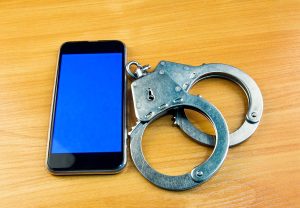
Disclaimer: This content is for informational purposes only and does not constitute legal advice. Laws and court interpretations change regularly, and every situation presents unique circumstances. If law enforcement has requested access to your phone or you face criminal charges involving digital evidence, contact a licensed Louisiana criminal defense attorney immediately to discuss your specific case and protect your constitutional rights.
Few situations create more immediate stress than seeing a Louisiana police officer reach for your phone during a traffic stop, arrest, or investigation.
Your smartphone contains intimate details of your life: text conversations with family members, financial information, photos, location history, and private communications that reveal far more than any physical search of your pockets or vehicle ever could.
The intersection of constitutional protections and rapidly evolving technology has created a complex legal landscape. Understanding your rights regarding phone searches under both the U.S. Constitution and Louisiana law can mean the difference between evidence being used against you or suppressed entirely. Electronic privacy protections directly affect the admissibility of evidence in criminal proceedings, making this knowledge critical for anyone facing potential charges.

Your cell phone falls within the “effects” protected by the Fourth Amendment. Courts have recognized that modern smartphones function as extensions of human memory and contain exponentially more personal information than any physical container.
The U.S. Supreme Court in Riley v. California, 573 U.S. 373 (2014), established unequivocally that cell phones merit heightened Fourth Amendment protection due to their capacity to store “the privacies of life” in digital form.
This protection means Louisiana law enforcement cannot conduct searches that are “unreasonable” under constitutional standards.
Reasonableness typically requires either a valid warrant supported by probable cause or circumstances that fall within recognized exceptions to the warrant requirement.
A valid search warrant in Louisiana must meet several constitutional and statutory requirements under Louisiana Code of Criminal Procedure Article 162 and related provisions.
Essential warrant elements include:
For phone searches specifically, warrants should identify the particular device by make, model, or serial number, and ideally specify the types of data sought (text messages, photos, location data, etc.) rather than authorizing wholesale downloading of all phone contents.
Exceptions where warrants may not be required:
Despite the general warrant requirement, Louisiana courts recognize several established exceptions that can permit warrantless searches in specific circumstances. These exceptions must be narrowly construed and truly justified by the situation.
Law enforcement cannot simply invoke an exception label without factual support. The most common exceptions affecting phone searches include consent, exigent circumstances, and limited searches incident to arrest (discussed in detail below).
Louisiana’s constitution provides independent privacy protections that may, in some contexts, exceed federal minimums.
Article I, Section 5 of the Louisiana Constitution states: “Every person shall be secure in his person, property, communications, houses, papers, and effects against unreasonable searches, seizures, or invasions of privacy.”
The explicit inclusion of “communications” and “invasions of privacy” in Louisiana’s constitutional language potentially offers stronger protection for digital communications stored on phones.
Louisiana courts interpret these provisions independently, meaning that even if a search satisfies the Federal Fourth Amendment, it might still violate Louisiana’s state constitutional protections.
Federal precedents influencing Louisiana phone searches:
Riley v. California (2014) represents the landmark Supreme Court decision governing phone searches nationwide. Chief Justice John Roberts wrote that cell phones are “now such a pervasive and insistent part of daily life” that they deserve special constitutional consideration.
The Court held unanimously that police generally cannot search digital information on a cell phone seized from an arrestee without a warrant, rejecting the traditional “search incident to arrest” exception that applies to physical items like wallets or cigarettes.
More recently, Carpenter v. United States, 585 U.S. 296 (2018), extended warrant requirements to historical cell site location information (CSLI), recognizing that digital tracking data reveals intimate details about individuals’ movements and associations.
These federal precedents establish constitutional floors that Louisiana courts must respect, though Louisiana may provide additional protections under state law.
Despite strong constitutional protections, Louisiana law enforcement can lawfully search your phone without a warrant in limited, well-defined circumstances.
Voluntary consent represents the most frequently invoked exception to warrant requirements.
If you give Louisiana police permission to search your phone, officers can immediately access it without obtaining judicial authorization. But consent must be truly voluntary, not the product of coercion, deception, or duress.
What giving consent means legally:
Under Louisiana law, your refusal to consent cannot be used as evidence of guilt or to establish probable cause for a warrant. La. C.Cr.P. art. 215.1 requires that warrantless searches be justified by independent grounds beyond mere refusal to cooperate.
Louisiana courts recognize that genuine emergencies may justify immediate warrantless searches when waiting for a warrant would create serious risks.
Exigent circumstances must be objectively reasonable and verified by facts, not mere speculation by officers.
Situations courts have upheld:
Louisiana appellate courts scrutinize exigency claims carefully. Courts have emphasized that officers must articulate specific, articulable facts supporting the emergency.
Generalized concerns about evidence destruction do not suffice. If police created the exigency through unreasonable conduct, courts may refuse to excuse the warrant requirement.
The traditional doctrine of “search incident to arrest” permits officers to search an arrestee’s person and immediate surroundings to ensure officer safety and prevent evidence destruction.
How phone access is limited compared to physical property:
Recent rulings restricting warrantless searches during arrests:
Riley established that the immense storage capacity and diverse sensitive information on smartphones distinguishes them from physical containers.
Even when properly arrested for crimes ranging from DUI to drug distribution to violent felonies, Louisiana defendants maintain Fourth Amendment protections for their phone contents. Officers must apply for warrants describing with particularity what data they seek and demonstrating probable cause that crime-related evidence exists on the device.
The actions you take during police encounters significantly impact your legal position. Following these guidelines protects both your immediate safety and your long-term legal interests.

While you must firmly protect your constitutional rights, doing so confrontationally creates unnecessary legal complications and risks additional charges like resisting arrest or disturbing the peace.
Communicate clearly but politely:
Remember that many Louisiana police encounters are recorded by body cameras or dash cameras. How you conduct yourself during the interaction creates an evidentiary record that prosecutors and judges will later review.
The Fifth Amendment protects against compelled self-incrimination. This protection extends to providing information that helps law enforcement access your phone’s contents.
Do not provide passwords or unlock your device:
How statements can be used against you in court:
Anything you say to Louisiana law enforcement, including statements about your phone’s contents, who you were texting, or whether particular photos exist, can become evidence against you. Even seemingly innocent explanations like “I was just texting my friend about what happened” provide prosecutors with information about evidence location and context.
Common mistakes that compromise phone privacy include:
Louisiana’s complex criminal procedure, evolving digital privacy law, and high stakes in criminal cases make immediate attorney consultation essential.
An experienced criminal defense lawyer can:
Understanding how unlawful phone searches affect your criminal case helps you appreciate why asserting constitutional rights matters so significantly.
How illegally obtained evidence can be challenged in court:
Louisiana Code of Criminal Procedure Article 703 permits defendants to file motions to suppress evidence obtained through constitutional violations.
If the court finds that police searched your phone without a warrant and without a valid exception, the exclusionary rule requires suppression of that evidence—meaning prosecutors cannot introduce it at trial.
Suppression steps:
Evidence suppression can fundamentally transform criminal prosecutions. Phone evidence often provides crucial links in the state’s case—text messages arranging drug transactions, photos establishing presence at crime scenes, internet searches suggesting intent, or GPS data placing defendants at specific locations.
When this evidence is suppressed:
Long-term implications for plea deals, trial outcomes, or sentencing:
Beyond immediate case dismissals, successful suppression motions create ripple effects throughout criminal proceedings. Prosecutors facing weakened cases become more willing to negotiate favorable plea agreements.
If cases proceed to trial, judges and juries never learn about suppressed evidence, which may have been the most damaging proof against defendants.
For criminal charges where Louisiana law now requires serving 85% of sentences without parole eligibility (effective August 1, 2024, for all offenses committed on or after that date), suppressing key evidence can mean the difference between decades in prison and freedom.
Proactive measures reduce the likelihood that Louisiana law enforcement can access your phone’s contents even if they physically possess the device.
Enable strong passwords and biometric security:
Avoid sharing access codes with others:
Document any interactions with law enforcement regarding phone searches:
Keep a record of legal advice and correspondence:
Your smartphone contains more personal information than police could obtain from searching your home, car, and office combined.
Louisiana law enforcement increasingly focuses on digital evidence when building criminal cases, making constitutional protections against unreasonable phone searches
Do not face criminal charges and digital privacy violations alone. Chad Ikerd and the Ikerd Law Firm has successfully defended over 1,000 Louisiana clients against serious criminal charges, with extensive experience challenging unlawful searches and suppressing illegally obtained evidence.
Louisiana-licensed. Battle-tested. Ready to defend your constitutional rights. Call (337) 366-8994 for a consultation.